Table of Contents
Introduction
In today’s dynamic business environment, leaders are increasingly turning to mindfulness and meditation as essential tools for enhancing both their personal well-being and professional effectiveness. Mindfulness, the practice of maintaining a moment-by-moment awareness of our thoughts, feelings, and surroundings, is at the heart of meditation.
It helps leaders manage stress and improve concentration, offering a clearer perspective in decision-making processes. This blog post explores the compelling reasons every business leader should consider integrating meditation into their daily routine, highlighting its positive impact on clarity, creativity, and resilience.
The Power of Meditation in Business
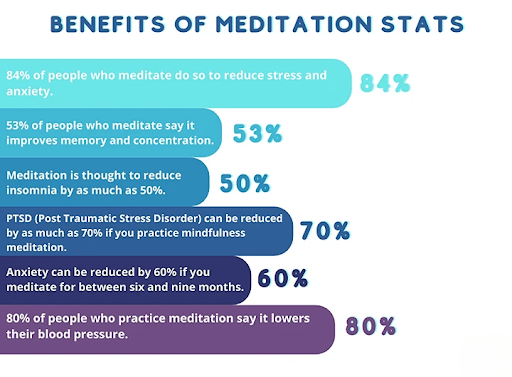
In the high-pressure environment of modern business, meditation offers leaders a way to cultivate the mental clarity and emotional stability necessary for sustained success.
- Research has shown that regular meditation can significantly improve cognitive functions, such as focus, memory, and decision-making
- By training the mind to remain present and aware, meditation helps leaders cut through the noise and make decisions with greater precision and confidence
- This enhanced cognitive ability is particularly valuable in environments where quick thinking and problem-solving are paramount
- Moreover, meditation increases emotional intelligence, a critical component of effective leadership
- It fosters a deeper awareness of one’s emotions and the emotions of others, leading to better communication, stronger relationships, and a more empathetic approach to leadership
- Leaders who meditate are more likely to respond thoughtfully rather than react impulsively, creating a more harmonious and productive workplace.
Incorporating meditation into your daily routine can be a game-changer, enabling you to lead with clarity, empathy, and resilience. It’s not just about finding moments of calm—it’s about transforming the way you lead and live.
The Science Behind Meditation
Mental Clarity and Focus
Neuroplasticity
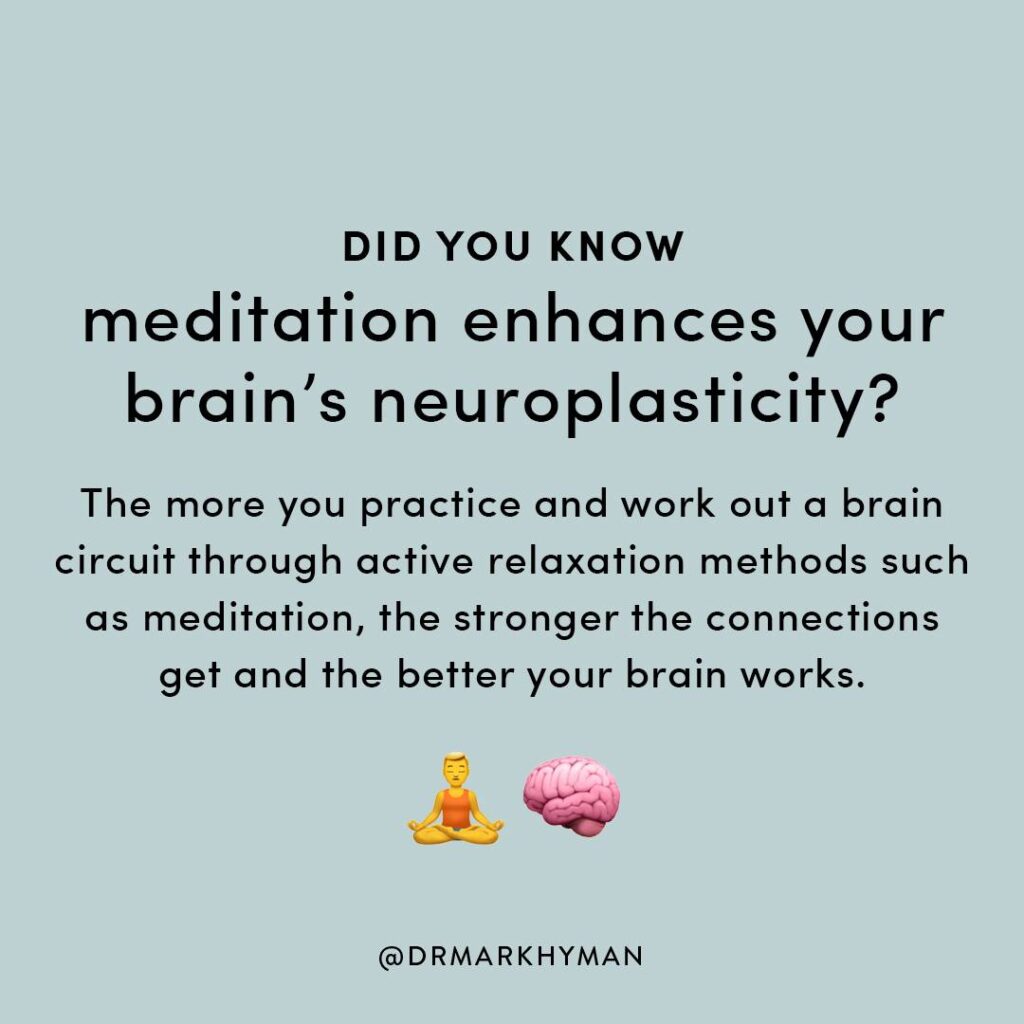
- Meditation has a profound impact on the brain’s structure and function through a process known as neuroplasticity
- Neuroplasticity is the brain’s ability to reorganize itself by forming new neural connections throughout life
- For example, studies have shown that regular meditation increases the thickness of the prefrontal cortex, the area of the brain responsible for higher-order functions like decision-making, attention, and self-regulation
- This rewiring helps individuals maintain sharper focus and enhances their ability to concentrate on tasks without being easily distracted.
Enhanced Decision-Making
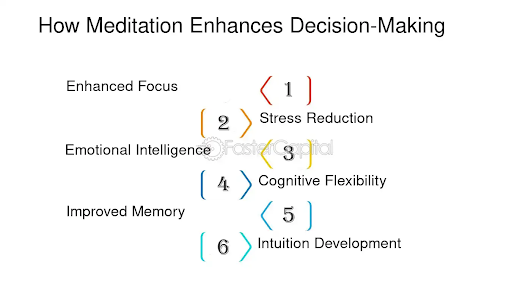
- Meditation also plays a critical role in improving decision-making abilities. One of the primary ways it does this is by reducing stress and anxiety, which are known to cloud judgment and impair cognitive function
- Research has shown that regular meditation practice can lower levels of cortisol, the stress hormone, leading to a calmer, more composed state of mind
- This reduction in stress allows for clearer thinking and better evaluation of options, resulting in more effective decision-making
- Additionally, meditation enhances mental clarity by promoting mindfulness, a state of present-moment awareness that helps leaders make more informed, deliberate choices rather than reactive or impulsive decisions.
Emotional Intelligence
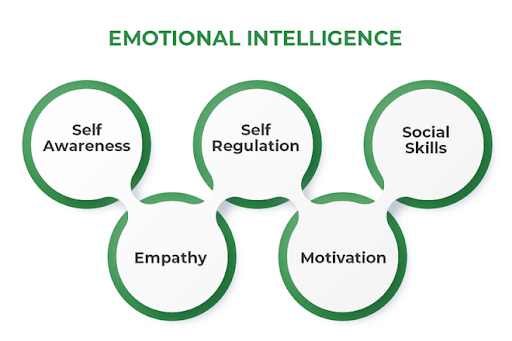
Stress Reduction
- Stress management is a key component of emotional intelligence, and meditation is a powerful tool in this regard
- By lowering cortisol levels, meditation helps individuals manage stress more effectively, reducing the likelihood of burnout and emotional exhaustion
- When stress levels are managed, leaders can approach challenges with a calm and clear mind, enabling them to maintain composure in high-pressure situations
- This stress reduction not only benefits the individual but also creates a more positive work environment, as calm and collected leaders are better equipped to guide their teams through difficult times.
Improved Empathy
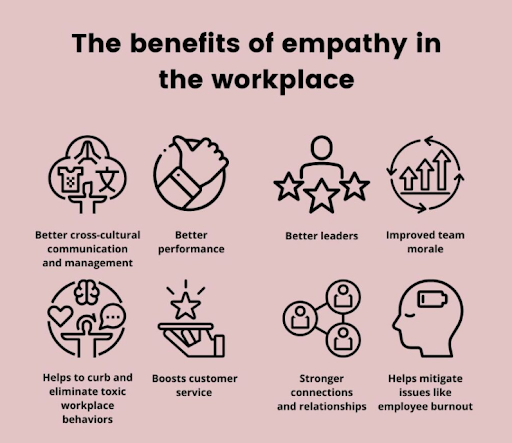
- Regular meditation practices have been shown to enhance empathy, a critical aspect of emotional intelligence
- Meditation fosters a deeper awareness of one’s own emotions and the emotions of others
- This heightened emotional awareness allows leaders to connect with their team members on a more personal level, fostering stronger relationships and better communication
- As a result, leaders who meditate are more likely to respond to their team’s needs with understanding and support, leading to improved team dynamics and overall morale.
Creativity and Innovation
Open-Mindedness
- Meditation encourages open-minded thinking by breaking down mental barriers and habitual thought patterns
- It fosters a mindset of curiosity and openness, essential traits for creativity and innovation
- By quieting the constant chatter of the mind, meditation allows individuals to access deeper levels of thought and explore new ideas without judgment or preconceived notions
- This state of mental openness is crucial for brainstorming sessions, where the ability to think outside the box and consider unconventional solutions can lead to groundbreaking innovations
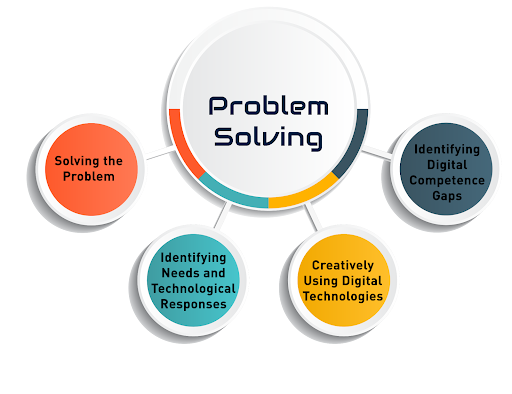
- A calm mind, cultivated through meditation, is better equipped to solve complex business challenges
- When the mind is cluttered with stress and distractions, it becomes difficult to approach problems with clarity and focus
- Meditation helps to clear the mind, creating a mental space where logical thinking and creativity can thrive
- By fostering a calm and focused mindset, meditation enhances the problem-solving abilities of business leaders, enabling them to navigate the complexities of the modern business environment with greater ease.
Health Benefits of Meditation for Business Leaders
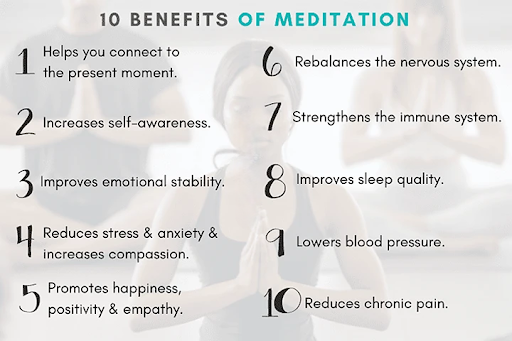
Enhanced Focus and Productivity: One of the immediate benefits of meditation is improved concentration. By training the mind to stay present, business leaders can reduce distractions, make better decisions, and stay focused on their goals.
- Stress Reduction: The business world is fraught with stressors that can lead to burnout. Meditation helps activate the body’s relaxation response, lowering cortisol levels and reducing anxiety.
- Improved Decision-Making: Meditation encourages mindfulness, allowing leaders to approach problems with a clear and balanced mind. This state of awareness enables better judgment and more thoughtful decision-making, which is crucial when navigating complex business challenges.
- Emotional Intelligence and Empathy: Meditation helps leaders become more self-aware and in tune with their emotions, which enhances their ability to empathize with team members and build stronger, more collaborative relationships.
- Resilience and Adaptability: The business landscape is constantly changing, and leaders must be able to adapt quickly to new circumstances. Meditation fosters a mindset of resilience, helping leaders remain adaptable and open-minded, ready to face any challenge with confidence.
Simple Meditation Practices for Busy Leaders
You don’t need to spend hours meditating to experience its benefits. Here are some simple meditation practices that even the busiest business leaders can incorporate into their daily routine:
- Mindful Breathing: Take a few minutes each day to focus on your breath. Sit comfortably, close your eyes, and pay attention to the sensation of breathing in and out. If your mind wanders, gently bring your focus back to your breath.
- Body Scan Meditation: At the end of a long day, take five minutes to do a body scan. Sit or lie down in a quiet place, close your eyes, and mentally scan your body from head to toe. Notice any tension or discomfort and consciously relax each part of your body.
- Mindful Walking: If sitting meditation isn’t your style, try mindful walking. Take a walk in a quiet place and focus on the sensation of your feet touching the ground, the movement of your body, and the sounds around you.
- Gratitude Meditation: At the beginning or end of each day, reflect on what you are grateful for for a few moments. Focus on the positive aspects of your life and your work, and let go of any negative thoughts or worries.
Real-World Examples of Prominent Figures Who Meditate
Prominent Figures
Lord Buddha
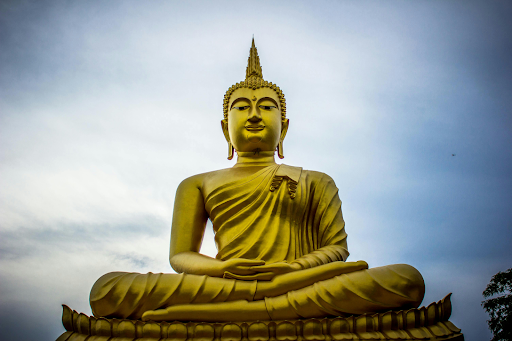
- Lord Buddha, the founder of Buddhism, is perhaps the most iconic figure associated with meditation
- His journey to enlightenment began with deep meditation under the Bodhi tree, where he achieved Nirvana
- Buddha’s teachings emphasize mindfulness, meditation, and the importance of inner peace, which form the core of Buddhist practice
- His life and teachings have inspired countless individuals to adopt meditation as a path to spiritual awakening and personal transformation
- Buddha’s approach to meditation underscores its power in achieving clarity of thought, emotional balance, and profound wisdom.
Dalai Lama

- The 14th Dalai Lama, Tenzin Gyatso, is a spiritual leader who exemplifies the integration of meditation into daily life
- Known for his teachings on compassion, non-violence, and inner peace, the Dalai Lama practices meditation regularly as a means of maintaining emotional stability and mental clarity
- He often speaks about the benefits of meditation for developing a calm mind, which is essential for making sound decisions and leading with compassion
- His approach has influenced many around the world to incorporate meditation into their lives as a way to foster peace and harmony, both within themselves and in their interactions with others.
Swami Vivekananda

- Swami Vivekananda, a key figure in introducing Indian philosophies of Vedanta and Yoga to the Western world, was a strong advocate of meditation
- He believed that meditation was crucial for mental discipline, self-realization, and achieving higher states of consciousness
- Vivekananda’s teachings emphasized the importance of meditation for gaining control over the mind and developing inner strength
- His life and work have inspired many to explore meditation as a path to spiritual growth and empowerment
- Vivekananda’s influence continues to resonate, encouraging individuals to harness the power of meditation for personal and spiritual development.
Mahatma Gandhi
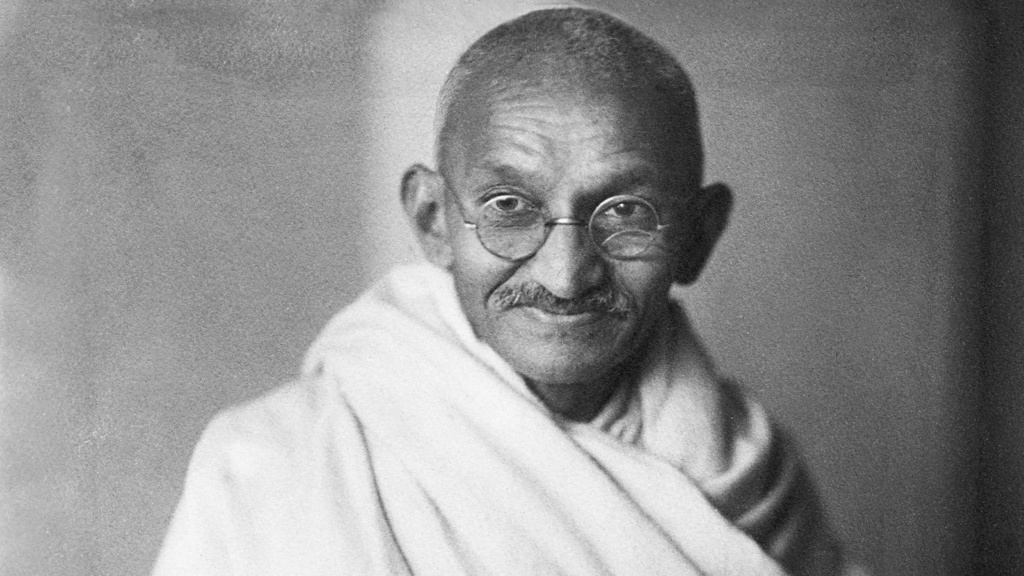
- Mahatma Gandhi, the leader of the Indian independence movement, was known for his commitment to non-violence and truth
- Meditation was a key practice in Gandhi’s life, helping him maintain his resolve and moral clarity in the face of immense challenges
- Gandhi used meditation as a tool to cultivate inner peace, patience, and the ability to respond to adversity with calm and compassion
- His approach to meditation reflected his belief in the power of self-discipline and inner strength, qualities that were crucial in his leadership and activism
- Gandhi’s legacy continues to inspire leaders to adopt meditation as a means of fostering ethical and mindful leadership.
Phil Jackson
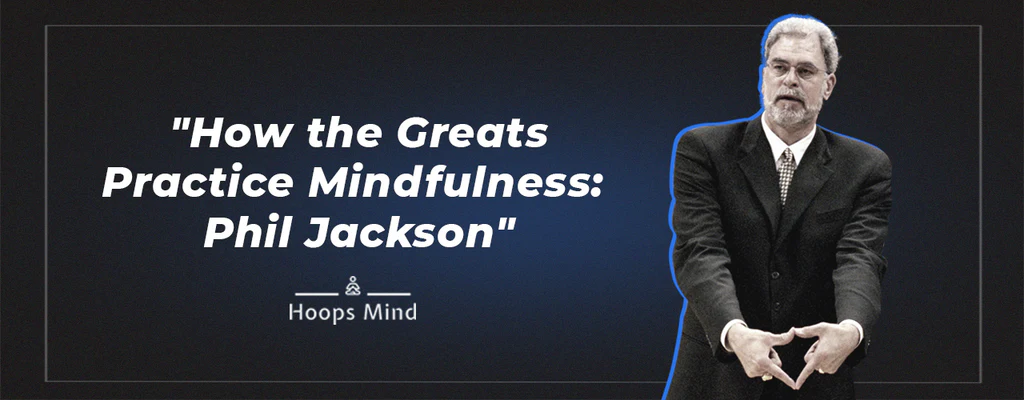
Phil Jackson, famously known as “The Zen Master,” incorporated meditation into his coaching to enhance focus and teamwork among his players. As a head coach in the NBA, Jackson introduced his teams to mindfulness meditation, emphasizing the importance of staying present and centered both on and off the court.
His approach was rooted in the belief that mental clarity and a cohesive team spirit were as crucial as physical skills in achieving success. Jackson’s meditation sessions often involved guided visualizations, breathing exercises, and techniques to help players manage stress and performance anxiety.
This practice was pivotal in fostering a calm and focused environment, which contributed significantly to his teams’ championship successes, demonstrating the powerful impact of meditation in high-pressure, competitive settings.
Corporate Culture
Google’s "Search Inside Yourself" Program
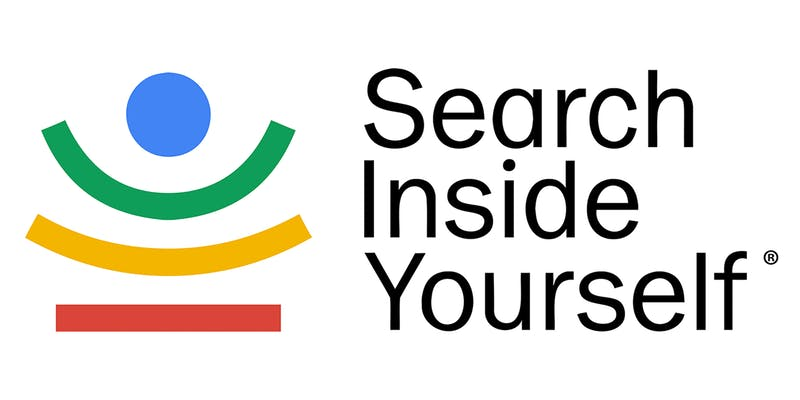
- Google, known for its innovative and progressive workplace culture, integrates meditation and mindfulness into its corporate environment
- The “Search Inside Yourself” program, developed at Google, teaches employees mindfulness techniques to improve focus, emotional intelligence, and leadership skills
- This program reflects the belief that meditation can enhance creativity, productivity, and overall well-being
- By incorporating meditation into the corporate culture, Google encourages employees to develop a calm, focused mind, which is essential for navigating the fast-paced and often stressful tech industry
- The success of this program has led to its adoption by other companies seeking to enhance their workplace culture.
Salesforce and Marc Benioff

- Marc Benioff, the CEO of Salesforce, is a strong advocate of mindfulness and meditation in the workplace
- Benioff believes that meditation can help leaders make better decisions and create a more compassionate corporate culture
- Salesforce encourages employees to practice mindfulness through dedicated spaces for meditation and the promotion of work-life balance
- Benioff’s emphasis on mindfulness reflects his broader approach to business, which prioritizes the well-being of employees alongside financial success
- By integrating meditation into the company’s culture, Salesforce has created an environment where innovation and emotional intelligence thrive
Aetna and Mark Bertolini
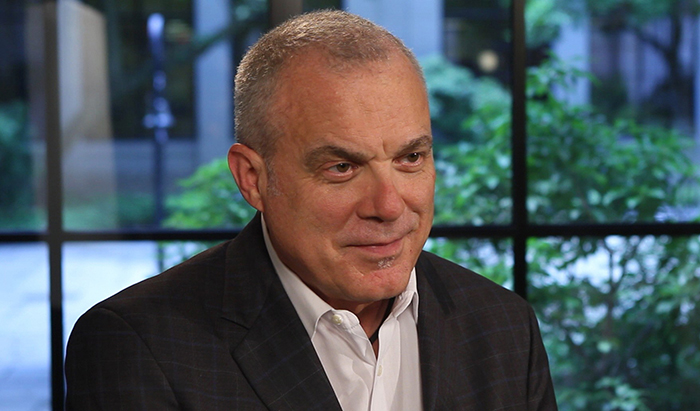
- Mark Bertolini, the former CEO of Aetna, introduced meditation and yoga programs to the company after experiencing the benefits of these practices in his own life
- Bertolini’s initiative was aimed at reducing stress, improving employee health, and increasing productivity
- The program offered mindfulness training to employees, leading to significant reductions in stress levels and improvements in overall well-being
- Aetna’s success with these initiatives highlights the impact that meditation can have on corporate culture, demonstrating that investing in the mental and emotional health of employees can lead to better business outcomes
LinkedIn and Jeff Weiner

- Jeff Weiner, the former CEO of LinkedIn, is known for his commitment to compassionate leadership, which he credits in part to his meditation practice
- Weiner has integrated mindfulness into LinkedIn’s culture, encouraging employees to take time for reflection and self-care
- Under his leadership, LinkedIn offered mindfulness courses and created spaces for meditation in the workplace
- Weiner’s approach emphasizes that meditation is not just about stress reduction but also about fostering empathy, patience, and thoughtful decision-making in leadership
- LinkedIn’s focus on mindfulness reflects a growing trend among companies to prioritize mental and emotional well-being as key components of corporate success.
Conclusion
Meditation is not just a practice for monks or yogis; it’s a valuable tool for business leaders who want to thrive in their professional and personal lives. By incorporating mindfulness into your routine, you can reduce stress, enhance focus, improve decision-making, and foster a more resilient and empathetic leadership style.
In a world where the only constant is change, meditation can provide the clarity and calm needed to navigate the complexities of modern business successfully. Embrace the power of meditation today, and unlock your full potential as a business leader. Your mind, your team, and your business will thank you for it.
Deepak Wadhwani has over 20 years experience in software/wireless technologies. He has worked with Fortune 500 companies including Intuit, ESRI, Qualcomm, Sprint, Verizon, Vodafone, Nortel, Microsoft and Oracle in over 60 countries. Deepak has worked on Internet marketing projects in San Diego, Los Angeles, Orange Country, Denver, Nashville, Kansas City, New York, San Francisco and Huntsville. Deepak has been a founder of technology Startups for one of the first Cityguides, yellow pages online and web based enterprise solutions. He is an internet marketing and technology expert & co-founder for a San Diego Internet marketing company.



